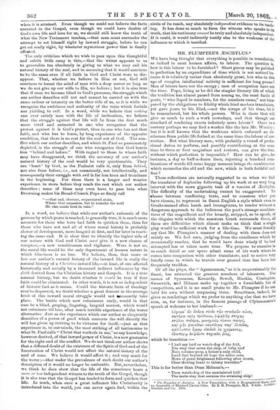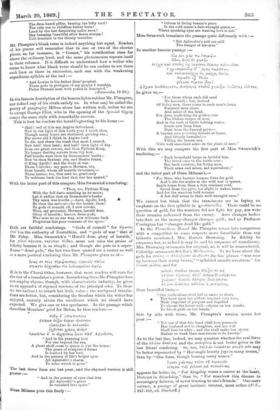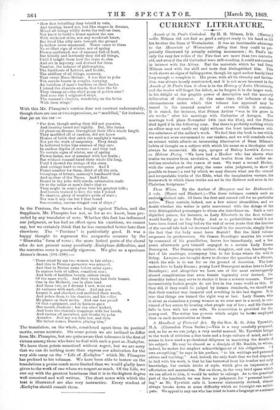MR. PLUMPTRE'S .ZESCHYLUS.*
WE have long thought that everything is possible in translation, as indeed in most human affairs, to labour. The question is,
how is this labour to be furnished ? Short pieces may be polished to perfection by an expenditure of time which is not noticed because it is relatively rather than absolutely great, but who in this age of complex intellectual activity is sufficient for long poems?
Men of leisure have not the energy ; men of occupation have not the time. Pope, living as he did the simpler literary life of which the tradition has almost passed from among us, the most facile of poets, " who lisped in numbers, for the numbers came," not hampered by the obligations to fidelity which bind modern translators, yet gave years to his Iliad,—not the scraps of his time, let it be remembered, but his whole powers. Who is there that will give as much to such a work nowadays, and that though our standard of rendering exacts infinitely more labour ? Once in a century perhaps we may find a worker like the late Mr. Worsley ; but it is well known that the weakness which enforced an ab stinence from public life forbad at the same time .the labour of correction. But what literary man, with probably a round of professional duties to perform, and possibly contributing at the same time to three or four magazines and reviews, can give the time without which perfection is impossible ? How can he give, for instance, a day to half-a-dozen lines, rejecting a hundred combinations of words till some happy moment brings the combination which reconciles the old and the new, which is both faithful and fine ?
These reflections are naturally suggested to us when we find the translator of Sophocles following up his work at no very long interval with the more gigantic task of a version of Eschylas.
The difficulty of the undertaking cannot be exaggerated. To choose between conflicting texts, and to construe what you have chosen, to represent in fluent English a style which even to Greeks seemed often harsh and incongruous, to render without a dangerous approach to the ludicrous the poet's strange combinations of the magnificent and the homely, stripped, so to speak, of the disguise with which the sonorous Greek surrounds them, all these are difficulties which almost make us think that a single play would be sufficient work for a life-time. We must frankly say that Mr. Plumptre's manner of dealing with them does not satisfy us. We feel sure, judging from the excellence which he occasionally reaches, that he would have done wisely if he had attempted less or taken more time. We propose to examine in as much detail as our space admit some of his work where he comes into comparison with other translators, and to notice very briefly some in which he travels over ground that has been less frequently trodden. Of all the plays, the " Agamemnon," as it is unquestionably the finest, has attracted the greatest numbers of labourers. The names of Symmons, Kennedy, Sewell, Blackie, Conington, Swauwick, and Milman make up together a formidable list of competitors, and it is no small praise to Mr. Plumptre if he can hold his own without surpassing them. Sometimes, indeed, he gives us renderings which we prefer to anything else that we have seen, as, for instance, in the famous passage of Clytemnestra's speech of welcome to her husband:—
xiyoqz e v livdpcc roods traiS erceOpc7n, ;dna., anrilpez van; crfeirorov, ip‘.14X;'); nip); crrliT.ey crodipz, p.ovorvic sizwow crarpi,
zai 7iiy WEArall VCCUTa01; :rap' iXa-ids, xti?.?,arrow yprap ihnilair ix xii,rhar44, aonrOpio di wvri forfa7os Aioc, which he translates
I hail my lord as watch-dog of the fold, The stay that saves the ship, of lofty roof Alain column-prop, a father's only child, Land that beyond all hope the sailor sees, Morn of great brightness following after storm, Clear-flowing fount to thirsty traveller."
This is far better than Dean Milman's,— " Thou watch-dog of the unattainted fold !
The main-stay that secures the straining ship!
The firm-based pillar, bearing the lofty roof ! The only son to childless father born! Land by the lost despairing sailor seen! Day beaming beautiful after fierce storms ! Cool fountain to the thirsty traveller.
Mr. Plumptre's blank verse is indeed anything but equal. Readers of his poems will remember that in one or two of the shorter pieces, as, as for instance, in " Gomer," his versification rises far above the ordinary level, and the same phenomenon repeats itself in these volumes. It is difficult to understand how a writer who seems to know what blank verse should be can endure to see three such lines as these in succession, each one with the weakening superfluous syllable at the end :— " And Loxias is his father Zeus' prophet.
These gods in prologue of my prayer I worship, Pallas Pronaia next with praise is honoured." (Eumenides, 18-20.)
In the famous description of the beacon lights neither Mr. Plumptre, nor indeed any of his rivals satisfy us. In what may be called the poetry of geography Milton alone has written well, unless we are to except George Eliot, who in the opening of the Spanish Gypsy essays the same style with remarkable success.
This is how he renders the herald's greeting to his home :—
" Hail ! soil of this my Argive fatherland,
Now in the light of this tenth year I reach thee, Though many hopes are shattered, gaining ono ; For never did I think in Argive land To die, and share the tomb that most I craved.
Now hail! thou land ; and hail! thou light of day.
Zeus our great sovran, and thou Pythian King, No longer darting arrows from thy bow.
Full hostile wast thou by Scamnudros' banks ; Now be thou Saviour, yea, and Healer found, 0 King Apollo! and the Gods of war.
These I invoke: my patron Hermes, too,
Dear herald, whom all heralds reverence,—
These heroes, too, that sent us, graciously
To welcome back the host that war has spared."
With the latter part of this compare Miss Swanwick's rendering:
"Thou, too, Pythian King, With thy fell darts assailing us no more; Let it suffice that on Scamander's banks
Thy mien was hostile ;—hero, Apollo, lord, ►
Be then the saviour—be the healer, thou!
Ye gods of council, all, I now invoke, Thee, my protector, Hermes, herald dear, Glory of heralds; heroes, domi-gods, Who sent us on our way, now welcome back Propitious this poor remnant of the spear."
Both are faithful renderings. " Gods of council " for ei7e0101 41"1 has the authority of Eustathius, and " gods of war " that of Mr. Paley. Miss Swanwick's " Herald dear, glory of heralds," for Tao zipexec,, xnp:!ixesv sigac, must not miss the praise of felicity because it is so simple ; and though she puts in a superfluous " demi-gods," the last two lines quoted are a neater as well as a more poetical rendering than Mr. Plumptre gives us of It is to the Choral Odes, however, that most readers will turn for the test of a translator's power. In rendering theseMr. Plumptre does not employ rhyme, though, with characteristic industry, he gives us an appendix of rhymed versions of the principal odes. To these we are inclined to attach but little value ; the unrhymed translations are better, but, considering the freedom which the writer has enjoyed, scarcely attain the excellence which we should have expected. We give one or two specimens. In the passage which describes Menelaus' grief for Helen, he thus renders:—
inrEpg-on-ia; ¢citricct IdOsz 66/LW avituotn,
cip.Oppoo dE xo?.otrcri-sv i'VErat xc'epp; icYdpi diavzciron d' is tovictig 'ippei Tied A;podis-a,
"And in his yearning love For one beyond the sea, A ghost shall seem to queen it o'er the house ; The grace of sculptured forms
Is loathed by her lord,
And in the penury of life's bright eyes All Aphrodite's charm
To utter wreck is gone."
The last three lines are but poor, and the rhymed version is still Poorer :—
"And in the penury of eyes that live All Aphrodite's grace Is vanished into space."
Dean Milman puts this finely :—
"Odious in living beauty's place
Is the cold statue's fine-wrought grace,—
Where speaking eyes are wanting love is not."
Miss Swanwick translates the passage quite differently with :— " Not Aphrodite's self can still Tho hunger of his oyes."
In another famous passage :—
54 thiv yap vi; ;11..Ep..4.1
tivri di
TE;ixn xai 6.7064 h; ixacrrou do,ttoo; ci ,x::rra, O xpusatkoi:4d' "Apr); croyheirto, zai raXarroiixo; is, /mixt), Sope;,
miptoeiv i,i; 'aim) rreP•TEI t3ap;)
,ice doudditpurok, di,ricopo; alrodoi; ).4r,Ta; t:Oiroo,
he gives us,
With this we may compare the first part of Miss Swauwick's
rendering,—
and the latter part of Dean Milmiuis,—
We cannot but think that the translators err in laying an emphasis on the first syllable in xpeo-ap.oa36;. There could be uo
question of gold, for the warriors did not fight for pay, nor were their remains redeemed from the enemy. Ares changes bodies into dust as the money-changer changes gold ; and so Professor Coningtou has "changes dead like gold."
In the Prometheus Bound Mr. Plumptre comes into comparison
with a competitor in some respects more formidable than any hitherto mentioned, Mrs. Barrett Browning. In fidelity he surpasses her, as indeed it may be said lie surpasses all translators.
Mrs. Browning ornaments her original, as, it will be remembered,
Coleridge ornaments Schiller's IIMIenstein. So we have about the gods for urcial; 01P6OLS'ere the fine phrase "war rose up between their starry brows," " syllabled smooth sweetness" for 2 Elms, A;:s0og, and for
z2..Lstv a;a2.7.1; r6rurp;k0q, these beautiful lines,—
Side by side with these, Mr. Plumptre's version seems but poor:-" Yet one of that fair band shall love persuade
Her husband not to slaughter, and her will Shall lose its edge ; and she shall make her choice Rather as weak than murderous to be known."
As to the last line, indeed, we may question whether the real force of the xXigiv rivaXxic and the ikiai0v0; is not better given in the less literal rendering. So, too, •;70).1.c7dY Lvothdrao 14406 Pia may be better represented by " Her single beauty joys in many names," than by " One form, though bearing many names."
appears far better in, " For kingship wears a cancer at the heart, Distrust in friendship," than in, " For somehow this disease in sovereignty Inheres, of never trusting to one's friends." One more extract, a passage of great intriusic interest, must suffice (P. V., 447-468, ed. Dindorff.)
With this Mr. Plumptre's version does not contrast unfavourably, though there are one or two expressions, as " muddled," for instance, that jar on the ear :—
" For first, though seeing they did not perceive,
And bearing heard not rightly. But, like forms Of phantom-dreams, throughout their life's whole length They muddled all at random, did not know Houses of brick that catch the sunlight's warmth, Nor yet the work of carpentry. They dwelt In hollowed holes like swarms of tiny ants In sunless depths of caverns ; and they had No certain signs of winter, nor of spring Flower-laden, nor of summer with her fruits ; But without counsel fared their whole life long, Until I showed the risings of the stars, And settings hard to recognize. And I Found number for them, chief of all the arts, Groupings of letters, memory's handmaid that And mother of the Muses. And I first Bound in the yoke wild steeds, submissive made Or to the collar or men's limbs that so They might in man's place bear his greatest toils ; And horses trained to love the rein I yoked To chariots, glory of wealth's pride of state ; Nor was it any one but I that found Sea-crossing, canvas-winged cars of ships ;"
In the Persians, the Seven who fought against Thebes, and the Suppliants, Mr. Plumptre has not, as far as we know, been preceded by any translator of note. Whether this fact has influenced our judgment, or has had an effect upon his exertions, we cannot say, but we certainly think that he has succeeded better here than elsewhere. The " Persians " is particularly good. It was a happy thought to represent the anapaestic measure by the " Hiawatha " form of verse ; the more lyrical parts of the choral odes do not present many peculiarly .-Eschylean difficulties, and the narrative verse is generally vigorous. We give as a specimen Atossa's dream (181-198) :—
"Thoro stood by me two women in fair robes ;
And this in Persian garments was arrayed, And that in Thirian came before mine oyes ; In stature both of tallest, comeliest size ; And both of faultless beauty, sisters twain Of the same stock. And they twain had their homes, One in the Hellenic, one in alien land.
And these two, as I dreamt I saw, were set At variance with each other. And my son Learnt it, and checked and mollified their wrath, And yokes them to his chariots, and his collar He places on their necks. And one was proud Of that equipment, and in harness gave Her mouth obedient ; but the other kicked, And tears the chariot's trappings with her hands, And rushes off uncurbed, and breaks its yoke Asunder. And my son falls low, and then His father comes, Dareios. pitying him."
The translation, on the whole, considered apart from its poetical merits, seems accurate. On some points we are inclined to differ from Mr. Plumptre, but are quite aware that tolerance is the first of virtues among those who have to deal with such a poet as .Eschylu.s. We leave these points unnoticed without regret, but we are sorry that we can do nothing more than express our admiration for the very able essay on the " Life of yEichylus " which Mr. Plumptre has prefixed to his volumes. We have been able to bestow on the translations a praise much more limited than we would gladly have given to the work of one whom we respect so much. Of the Life, we can say with the greatest heartiness that it is in the highest degree well conceived and well written. The short notes with which the text is illustrated are also very instructive. Every student of ./Eschyltui should consult them.




































 Previous page
Previous page